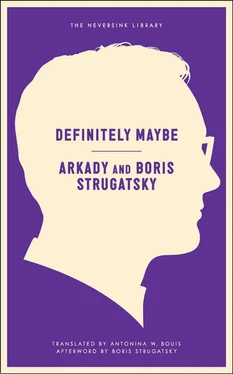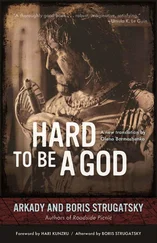“I mean, what I really had in mind,” Malianov said placatingly, “is that I don’t like it when impossible things are explained away by impossible causes. You know, Occam’s razor. Otherwise you come up with God knows what.”
“So, what’s your suggestion?” said Weingarten, placated, stuffing the empty bottle under the table.
“I don’t have one. If I did, I’d tell you. My brain’s been numbed by fear. Only it seems to me that if they’re really so all-powerful, they could have managed the whole thing a lot more simply.”
“How, for instance?”
“Oh, I don’t know. Well, they could have poisoned you with rotten canned goods. And Zakhar—given him a thousand-volt shock. And anyway, why even bother with all this killing and terror? If they’re such hotshot telepathists, they could have made us forget everything beyond simple math. Or created a conditioned reflex: as soon as we sat down to work, we’d get the runs, or the flu: drippy nose, achy head. Or eczema. There’s lots of stuff. Quietly, peacefully, no one would have even noticed.”
Weingarten was just waiting for him to finish.
“Look, Dmitri, you have to understand one thing.”
But Zakhar did not let him finish.
“Just a minute!” he pleaded, putting out his hands as though to lead Weingarten and Malianov to their separate corners. “Let me talk, while I still remember. Will you wait, Val, and let me talk? It’s about headaches. You just mentioned them, Dmitri. You know, I was hospitalized last year.”
It turned out that he was in the hospital the year before because there was something wrong with his blood, and he shared a room with this Vladlen Semenovich Glukhov, an orientalist. Glukhov was there with a heart condition, but that wasn’t the point. The point was that they got to be friends and met once in a while after they got out. And, just two months ago, that same Glukhov complained to Gubar that he had this huge project for which he had been gathering material for ten years and it was all going to hell because of a strange idiosyncrasy that Glukhov had developed. Namely: As soon as he sat down to write up his research, his head began aching terribly, to the point of nausea and fainting spells.
“And yet he would think about his work freely,” Zakhar continued, “read materials, and even, I think, talk about it… though I’m not sure, and I don’t want to lie to you. But he couldn’t write about it at all. And after what you just said, Dmitri…”
“Do you know his address?” Weingarten demanded.
“Yes.”
“Does he have a phone?”
“Yes. I have the number.”
“Go ahead, invite him over here. He’s one of us.”
Malianov jumped up.
“Go to hell!” he shouted. “You’re nuts! You can’t do that. Maybe he’s just got a thing about it.”
“We all have a thing.”
“Val, he’s an orientalist! A completely different field!”
“It’s the same one, buddy, I swear it’s the same one.”
“Don’t do it! Zakhar, sit down, don’t listen to him. He’s drunker than a coot.”
It was horrible and impossible to picture a normal and total stranger coming into this hot, smoke-filled kitchen and immersing himself in the pervasive madness, terror, and drunkenness.
“Look, why don’t we do this?” Malianov insisted. “Why don’t we call Vecherovsky? I swear it’ll do more good.”
Weingarten had no objections to Vecherovsky. “Right,” he said. “That’s a good idea, calling Vecherovsky. Vecherovsky, he’s got a head on his shoulders. Zakhar, go call your Glukhov, and then we’ll call Vecherovsky.”
Malianov desperately didn’t want any Glukhovs. He begged, he pleaded, he insisted that it was his house and that he was going to throw all of them out on their ears. But it was no good going against Weingarten. Zakhar went off to call Glukhov, and the boy slipped off the stool and followed him like a shadow
Excerpt 14…. Zakhar’s son, comfortably ensconced on the corner of the bed, graced the proceedings with occasional readings from the Popular Medical Encyclopedia , given to him by Malianov to keep him quiet. Vecherovsky, strikingly elegant in contrast to the sweaty, disheveled Weingarten, listened and looked at the strange boy curiously, raising his red eyebrows high. He had not yet said anything substantial—he had asked a few questions that had, to Malianov (and not to Malianov alone), seemed irrelevant. For instance, for no reason at all, he asked Zakhar if he was often in conflict with his supervisors and Glukhov if he liked to watch television. (It turned out that Zakhar never had conflicts with anybody, that was his personality, and Glukhov did like to watch television, not only liked it, but couldn’t resist it.)
Malianov really liked Glukhov. In general, Malianov didn’t like seeing new people in old company; he was always afraid they would misbehave somehow and he would be embarrassed for them. But Glukhov turned out to be okay. He was extremely cozy and unthreatening—a little scrawny, snub-nosed fellow with reddish eyes hidden by strong glasses. When he arrived he happily drank the glass of vodka Weingarten offered him and was visibly saddened when he learned it was the last one in the house. When he was subjected to cross-examination, he listened to each one attentively, leaning his head professorially to the right and looking to the right as well. “No, no,” he replied apologetically. “No, nothing like that happened to me. Please, I can’t even imagine anything like that. My thesis? I’m afraid it’s too foreign for you: ‘The Cultural Influence of the USA on Japan: An Attempt at a Qualitative and Quantitative Analysis.’ Yes, my headaches seem to be some idiosyncrasy: I’ve discussed it with major doctors—a rare case, they said.”
In general, they laid an egg with Glukhov, but it didn’t matter, it was nice that he was there. He was a real down-to-earth guy. He drank heartily and wanted more, ate caviar with childlike glee, preferred Ceylon tea, and his favorite reading matter was mysteries. He watched the strange child with reserved apprehension, laughing uncertainly from time to time, listened to the delirious tales with uncommon sympathy, and scratched behind both ears, muttering, “Yes, that’s amazing, unbelievable!” In a word, everything about Glukhov was clear to Malianov. There would be no new information and certainly no advice coming from him.
Weingarten, as usual when Vecherovsky was around, lowered his profile. He even looked more presentable and stopped shouting and calling people “buddy.” However, he did eat the last grains of the black caviar.
If you didn’t count the brief replies to Vecherovsky’s questions, Zakhar said nothing. He didn’t even get to tell his own story—Weingarten took that upon himself. And he stopped admonishing his son and just smiled painfully as he listened to the helpful quotations about the diseases of various delicate organs.
And so they sat in silence. Sipping cold tea. Smoking. The windows of the house across the street shone molten gold, the silver sickle of the new moon hung in the dark blue sky, and there was a sharp crackling sound coming through the window—they must have been burning old crates again on the street. Weingarten rustled his pack of cigarettes, peeked inside, crumpled it up, and softly asked: “Who’s got any cigarettes left?” “Here, help yourself,” Zakhar replied in a low voice. Glukhov coughed and rattled his teaspoon in the glass.
Malianov looked over at Vecherovsky. He was sitting in his chair, his legs stretched out and crossed at the ankles, studying the nails of his right hand. Malianov looked at Weingarten. Weingarten was smoking and watching Vecherovsky over the glowing tip of his cigarette. Zakhar was looking at Vecherovsky. And Glukhov. Malianov was struck by the silliness of the situation. What, actually, do we expect from him? So, he’s a mathematician. So, a major mathematician. So, let’s say he’s a very major mathematician—a world-famous mathematician. So? We’re like a bunch of children. God! We’re lost in the woods and trustingly flutter our eyes at the nice man: Oh, he’ll lead us out.
Читать дальше












